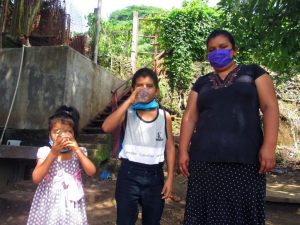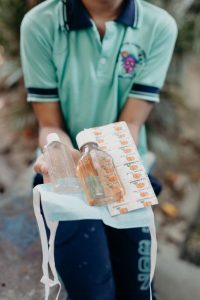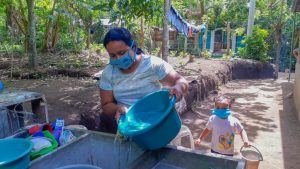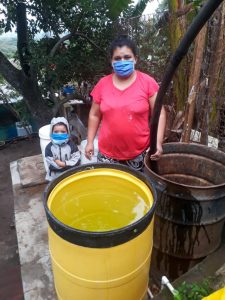No water, no protection: A Salvadoran village’s dry reality
Others, COVID-19 , FamilyContributed by: Compassion Canada
We’re told to wash our hands to protect ourselves from the virus. But for families in Las Marías, El Salvador who have no water, this kind of protection is a luxury.
Written by: Laura Phillips
How do you protect yourself from COVID-19 when you don’t have water to wash your hands? What do you do when you walk to your tap, but nothing comes out?
These are the questions that fill the mind of Petrona, a young mother from Las Marías, El Salvador.
Today, El Salvador is in a desperate time of the COVID-19 pandemic. El Salvador’s second phase of reopening has now been postponed twice due to rising COVID-19 cases. Since mid-June, confirmed cases are up by about 400 per cent.
And for those who struggle with water scarcity—including the families in Petrona’s community—things are looking a lot worse.

Petrona and two of her children.
“When the quarantine began three months ago, the municipal water tank truck stopped distributing water in the neighbourhood, and the community water tank was empty,” says Petrona.
A lingering water issue and a creative solution
Even in normal conditions, the families of Las Marías struggle to perform everyday tasks like brushing their teeth, cooking and washing their hands, one of the most important measures to prevent COVID-19.
Since the pandemic began, the staff at the Compassion centre that Petrona’s four-year-old daughter, Milagro, attends have educated children through phone calls and videos on how to properly wash their hands and practice good hygienic habits.

Items that are given in a hygiene kit to families like Petrona’s.
“When the crisis began, the centre supplied us with food bags and hygienic kits that had soap, gel sanitizers, facial masks, toilet paper and bleach. The gel sanitizer helps us a lot because we need to prioritize our water use, and we know that children need to have clean hands to be protected,” says Petrona.
As the pandemic continues, Compassion’s church partner in Las Marías continues to provide for the urgent needs of vulnerable families.
When the mandatory quarantine began, they prioritized providing water to 16 vulnerable families who live in their neighbourhood, a total of 62 people.
“Knowing that they don’t have water amid this pandemic was something that increased our fear for them because they were not able to wash their hands, cook or make the daily hygienic habits that can prevent the COVID-19 contagion,” says Mercedes, the Compassion centre director.
With this concern, Mercedes and her team hired a private water tank truck to visit the community and deliver water to each of these families.
But finding a supplier was the easiest part of their initiative. Las Marías is a high-risk community because of the presence of gangs that don’t allow strangers to access their neighbourhood.
For this reason, Sister Carito, who lives in Las Marías and is also a tutor volunteer in the centre, bravely went and asked the gang leader to let the water tank truck access their community.
The gang leader had heard about the support the church provides for families in need and agreed to grant entrance to the water tank into his neighbourhood.
Full pitchers and bowls
Young mother, Yesenia, is another one of the 16 families supported in Las Marías. She is going through a difficult situation with her two children alone. Her husband was stranded in Guatemala when the borders closed and quarantine began. He is the main provider for the family, selling shoes on the Guatemalan border.

Yesenia fills up her sink with water from the water tank truck. Her daughter, Raquelita, follows behind with a bucket of water.
Thankfully, water is one less problem for her to worry about.
Thanks to Compassion’s church partner, Yesenia receives three barrels of water each week. All her big bowls and pitchers are now full—something that would have been impossible for her family to purchase themselves.
“I feel thankful to have this water because I have now gone 89 days without my husband, who is the main provider of the family, and now I don’t have money to eat and even less money to buy water for my family,” Yesenia says.
Today, the family is grateful for the support because she is receiving continuous food bags and water from Compassion’s church partner. Her three-year-old daughter, Raquelita, carefully follows the instructions on washing her hands.

Petrona fills up her barrels with water from the water tank truck that Compassion provided.
“I like to take daily showers with water, wash my hands and wash my little clothes,” says Raquelita.
“I felt scared to get the virus,” says Yesenia. “Now that we can have water to wash our hands, it’s a relief.”
The families in the program believe that the work of the church is priceless. They can feel their commitment to them, and the love of God through their kind actions.
“God is using each volunteer and sponsor to be a blessing to many people who live in need,” says Yesenia. “On many occasions, we didn’t have anything to eat, and the food bag appeared through the church. The same thing happened with the water. They give and help us when we need it most.”
Originally posted on: https://www.compassion.ca/blog/no-water-no-protection-a-salvadoran-villages-dry-reality/

